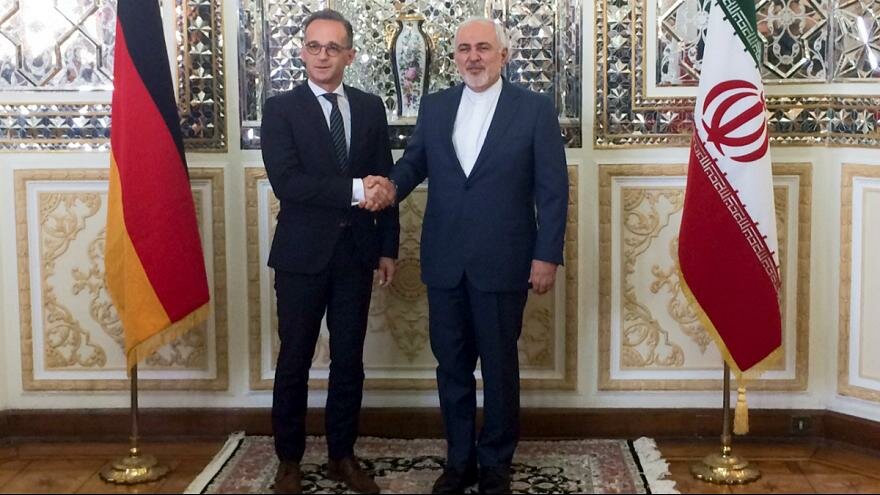Zarif: Anyone who starts war on Iran will not be the one who ends it

TEHRAN – Iranian Foreign Minister Mohammad Javad Zarif said on Monday that anyone who starts a war against Iran will not be the one who ends it.
During a joint press conference with German Foreign Minister Heiko Maas in Tehran, Zarif insisted on Tehran’s long-held position that Iran has not initiated and will not initiate a war with a country.
He noted that no one can take a military action against the Iranian people without receiving a “firm response”.
Zarif also said that the “economic war” against Iran should be stopped as the only way to reduce tension in the region.
“The only way to reduce tension is stopping the economic war. One cannot expect that those who have launched economic war and those who support it can be safe when there is an economic war against the Iranian ordinary people,” the chief diplomat remarked.
Zarif added, “This war is very dangerous for the region and the world. The United States’ actions after quitting the JCPOA [the 2015 nuclear deal] have targeted the Iranian people who were supposed to enjoy the benefits of this deal more than anyone else.”
He noted that Iran has remained committed to its obligations under the Joint Comprehensive Plan of Action and this has been confirmed by the International Atomic Energy Agency for 15 times.
Zarif says: “The only way to reduce tension is stopping the economic war. One cannot expect that those who have launched economic war and those who support it can be safe when there is an economic war against the Iranian ordinary people.”He added Iran is committed to its obligations and defends the people’s rights.
Zarif told ABC News in an interview published on June 2 that “there will be consequences” if the U.S. keeps up its economic pressure campaign against Iran’s people.
Zarif labeled the new U.S. sanctions as “economic terrorism” that “targets ordinary Iranian people” because even though food and medicine are exempted from the sanctions, the financial transactions associated with them are not.
‘Iran’s actions are within JCPOA framework’
Zarif also said that Iran’s action by suspending some aspects of its commitments are within the framework of the JCPOA.
However, Zarif suggested that Iran is ready to the previous stage if the remaining members to the JCPAO take action to shield Iran from the U.S. sanctions.
“We are ready to stop these actions based on practical actions by the JCPOA partners.”
Zarif added that that Iran cooperates with Germany and other parties to salvage the deal.
On May 8, Iran announced a partial withdrawal from some aspects of the pact, saying that the country would no longer adhere to some of the limits on its nuclear activities. It also threatened to step up uranium enrichment if an agreement is not made within 60 days to protect it from the sanctions’ effects.
‘Iran wants implementation of JCPOA’
Zarif also said that his country actually wants the JCPOA to remain in effect.
Commenting on offers that Iran sit down for direct talks with the U.S., he said, “They should first show us that negotiations with the U.S. will have a benefit and then ask for talks.”
Zarif also rejected U.S. claims that Iran was destabilizing the region.
“Who is causing instability in this region? Did we give Saddam Hussain weapons? Did we back al-Qaeda? Did we imprison the Lebanese prime minister?” he asked.
“Is it us who are bombing civilians in Yemen every day? Did we support Daesh and al-Nusra or were they American weapons that Saudi Arabia gave them?” he added.
Maas: Germany supports JCPOA
Maas also said that Germany supports the JCPOA and recognizes Iran’s right to enjoy benefits of the deal.
But he acknowledged that the economic benefits Tehran hoped for from the deal were now “more difficult to obtain”, but urged Iran to fully respect the agreement.
It is in Iran’s “political and strategic interest to maintain this agreement and the dialogue with Europe”, Maas said.
Maas said that the UK, France and Germany support the JCPOA. However, he said, “The position of our three European countries is that we support the JCPOA and we want to continue our commitments but we cannot expect miracles.”
He also said, “We make efforts to make it possible to have economic cooperation with Iran. A financial mechanism called INSTEX has been devised in this respect.”
On January 31, France, Germany and Britain, the three European parties to the JCPOA, announced the creation of INSTEX, a special purpose vehicle aimed at facilitating legitimate trade between European economic operators and Iran.
NA/PA
Leave a Comment